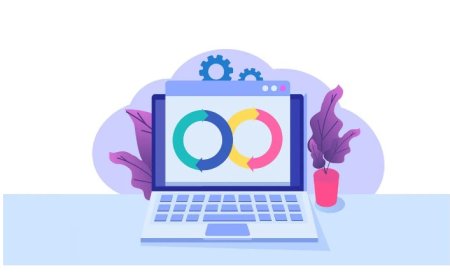The Role of Artificial Intelligence in Cloud Computing
Explore how the convergence of Artificial Intelligence (AI) and Cloud Computing is revolutionizing industries. Discover the benefits, applications, and future trends of this dynamic partnership.

In today's rapidly evolving technological landscape, the fusion of Artificial Intelligence (AI) and Cloud Computing stands as a pivotal advancement with transformative potential. Cloud Computing, which revolutionized the way we store, process, and access data, has now found a powerful ally in AI. This alliance promises to redefine the capabilities and possibilities of both technologies, unlocking new dimensions of efficiency, intelligence, and innovation. we delve into the intricate relationship between AI and Cloud Computing, uncovering the ways in which AI-driven solutions are reshaping cloud services and enabling businesses to reach greater heights.
Understanding Cloud Computing
What is Cloud Computing?
Cloud computing refers to the delivery of various computing services, including storage, processing, networking, and software, over the internet. Instead of relying on local servers or personal computers to handle these tasks, cloud computing leverages a network of remote servers hosted in data centers. These services are accessible on-demand and can be rapidly scaled up or down based on an organization's needs. Cloud computing has become a fundamental technology paradigm that has transformed the way businesses operate and individuals access and use digital resources.
Key Characteristics of Cloud Computing
Several key characteristics define cloud computing:
-
On-Demand Self-Service: Users can provision and manage computing resources as needed, without requiring human intervention from service providers. This self-service aspect allows for flexibility and efficiency in resource allocation.
-
Broad Network Access: Cloud services are accessible over the internet from a variety of devices, including laptops, smartphones, and tablets. This accessibility enables remote work, collaboration, and ubiquitous data access.
-
Resource Pooling: Cloud providers pool computing resources to serve multiple customers. This multi-tenant model ensures efficient resource utilization and cost-effectiveness.
-
Rapid Elasticity: Cloud resources can be quickly scaled up or down to accommodate changing workloads. This elasticity allows businesses to handle surges in demand without major infrastructure investments.
-
Measured Service: Cloud usage is metered and billed based on consumption. Users pay only for the resources they use, making cloud computing cost-effective and scalable.
Importance of Cloud Services in Modern Businesses
The adoption of cloud services has become integral to modern businesses for several reasons. First and foremost, cloud computing reduces the need for upfront capital expenditures on hardware and data centers. This cost-effectiveness enables organizations to redirect resources to core business activities and innovation.
Furthermore, cloud services offer scalability and flexibility, allowing businesses to adapt to changing market conditions and customer demands rapidly. The ability to access data and applications from anywhere enhances collaboration and remote work capabilities, increasing productivity and efficiency.
Cloud computing also plays a crucial role in disaster recovery and business continuity. Data stored in the cloud can be easily backed up and replicated across multiple geographic regions, ensuring data resilience and minimizing downtime in the event of disruptions.
Introduction to Artificial Intelligence
Artificial Intelligence, often abbreviated as AI, is a field of computer science that focuses on creating systems and machines capable of performing tasks that typically require human intelligence. At its core, AI seeks to develop algorithms and models that can mimic human cognitive functions, such as learning, problem-solving, and decision-making. It is a broad and interdisciplinary field that intersects with various domains, including computer science, mathematics, psychology, and neuroscience.
Artificial Intelligence
Artificial Intelligence can be defined as the simulation of human intelligence processes by machines, especially computer systems. These processes encompass tasks like reasoning, problem-solving, learning, natural language understanding, and perception. AI systems are designed to analyze large datasets, recognize patterns, make predictions, and adapt to changing circumstances, all without explicit programming.
Types of AI (Narrow vs. General AI)
There are two primary types of AI: Narrow AI (or Weak AI) and General AI (or Strong AI).
-
Narrow AI (Weak AI): This type of AI is designed for a specific task or a narrow range of tasks. It excels at performing well-defined, specialized functions. Examples include virtual personal assistants like Siri or Alexa, recommendation algorithms used by streaming services, and chatbots used for customer support.
-
General AI (Strong AI): General AI, on the other hand, is a hypothetical form of AI that possesses human-like intelligence and can perform any intellectual task that a human can do. It has the ability to understand, learn, and apply knowledge across a wide spectrum of domains. General AI remains a goal of AI research but has not been realized as of the current state of technology.
Applications of AI in Various Industries
AI has found applications across numerous industries, revolutionizing the way businesses operate and enhancing various aspects of our daily lives. Some notable applications include:
-
Healthcare: AI is used for disease diagnosis, drug discovery, and personalized treatment plans.
-
Finance: AI algorithms power fraud detection, risk assessment, and algorithmic trading.
-
Automotive: AI enables self-driving cars through computer vision and machine learning.
-
Manufacturing: AI-driven automation improves production processes and quality control.
-
Retail: AI is used for inventory management, customer insights, and recommendation engines.
-
Entertainment: AI is behind content recommendation systems for streaming platforms.
-
Agriculture: AI helps optimize crop yields, monitor livestock health, and manage resources.
-
Education: AI supports personalized learning and automates administrative tasks.
-
Natural Language Processing (NLP): AI-driven NLP is used in chatbots, language translation, and sentiment analysis.
These applications merely scratch the surface of AI's potential, and the field continues to evolve rapidly, offering new opportunities for innovation and problem-solving across diverse sectors.
The Convergence of AI and Cloud Computing
How AI and Cloud Computing Intersect
Artificial Intelligence and Cloud Computing are two powerful technological paradigms that have become increasingly intertwined in recent years. At their core, both AI and cloud computing are driven by data and computational resources. Cloud computing provides the necessary infrastructure, scalability, and accessibility, while AI leverages this infrastructure to process and analyze vast datasets. The synergy between the two lies in the ability to store, manage, and process data efficiently and at scale. In essence, cloud computing acts as the backbone that supports the computational demands of AI applications.
Benefits of Combining AI and Cloud Computing
The fusion of AI and cloud computing yields numerous benefits for organizations across various industries. Firstly, the cloud provides a cost-effective way to access AI resources. Instead of investing in dedicated, on-premises hardware, businesses can leverage cloud services to deploy AI algorithms and models, reducing capital expenditure. Additionally, the cloud's scalability and flexibility allow organizations to adjust their AI resources as needed, accommodating fluctuating workloads and demands. This elasticity is particularly valuable for machine learning and deep learning applications, which often require substantial computational power for training and inference. Moreover, cloud-based AI services offer democratized access, enabling organizations of all sizes to harness the capabilities of advanced machine learning models without extensive expertise in AI infrastructure management.
Real-World Examples of AI-Driven Cloud Services
Several real-world applications exemplify the convergence of AI and cloud computing. For instance, popular cloud providers such as Amazon Web Services (AWS), Microsoft Azure, and Google Cloud offer a range of AI services, including speech recognition, natural language processing, and computer vision. These services enable developers to integrate AI functionalities into their applications without having to build AI models from scratch. Another example is the use of AI-driven analytics platforms that leverage cloud infrastructure to process and analyze large datasets. These platforms find applications in sectors such as healthcare for medical image analysis, e-commerce for personalized recommendations, and finance for fraud detection. These real-world instances underscore how AI and cloud computing complement each other to deliver innovative solutions with efficiency and scalability.
AI-Powered Cloud Services
AI in Cloud Storage and Data Management
AI is transforming how data is stored and managed in the cloud. It empowers organizations to optimize data storage, enhance retrieval speeds, and gain valuable insights from their data. Machine learning algorithms can identify patterns and classify data, making storage more efficient. Additionally, AI-driven data management solutions provide advanced analytics capabilities, enabling businesses to make data-driven decisions and predictions.
AI-Enhanced Cloud Security
The integration of AI into cloud security has revolutionized the way organizations safeguard their data and resources. AI algorithms can detect anomalies and potential threats in real-time, bolstering cybersecurity measures. These systems continuously learn from evolving threats, adapting to new attack vectors and improving overall security posture. AI-driven security solutions are critical in safeguarding sensitive information in the cloud.
AI-Driven Automation in Cloud Operations
Automation is a cornerstone of cloud operations, and AI takes it to the next level. AI-powered automation streamlines routine cloud management tasks, such as provisioning and scaling resources. This not only increases operational efficiency but also enhances resource utilization and cost optimization. Furthermore, AI-driven cloud operations can predict and prevent issues, ensuring the reliability and availability of cloud services.
These AI-powered cloud services represent a dynamic synergy between artificial intelligence and cloud computing, bringing greater efficiency, security, and intelligence to cloud environments. They are pivotal in enabling businesses to harness the full potential of the cloud while staying competitive and secure in the digital landscape.
Machine Learning and Cloud Computing
In the convergence of Machine Learning (ML) and Cloud Computing, we explore how these two transformative technologies complement each other. Machine Learning, a subset of Artificial Intelligence, relies on vast datasets and computational power for training models. Cloud Computing provides the necessary infrastructure and scalability for ML algorithms to process and analyze data efficiently. This section delves into the symbiotic relationship between ML and Cloud Computing, emphasizing how cloud resources enhance the capabilities of machine learning applications. We also examine practical use cases, illustrating how businesses leverage this powerful combination to drive innovation and gain competitive advantages.
Future Trends and Developments
-
Integration of AI with edge computing for faster decision-making and reduced latency.
-
Continued growth in AI-powered chatbots and virtual assistants in cloud services.
-
Advancements in AI-driven predictive analytics for resource allocation and cost optimization in the cloud.
-
The rise of AI-driven cybersecurity solutions for identifying and mitigating threats in real-time.
-
Enhanced AI-driven automation for managing and scaling cloud infrastructure.
-
Adoption of AI in cloud-based healthcare applications, such as medical image analysis and patient data management.
-
Expansion of AI-driven recommendation systems in cloud-based content streaming services.
-
Development of AI-powered DevOps tools for continuous integration and delivery in the cloud.
-
Increasing use of AI in data analytics and machine learning platforms provided by cloud service providers.
-
Exploration of quantum computing's potential impact on AI and cloud computing.
The fusion of artificial intelligence and cloud computing represents a powerful alliance that is reshaping industries and driving innovation. The cloud provides the scalable infrastructure and vast computational resources needed for AI applications, while AI, in turn, enhances cloud services with intelligent automation, data insights, and improved security. As businesses and organizations continue to harness this synergy, they unlock new possibilities for efficiency, cost-effectiveness, and transformative growth. While challenges exist, such as privacy concerns and ethical considerations, the potential benefits are undeniable. The future promises even more exciting developments as emerging AI technologies and cloud services continue to evolve. Embracing this partnership allows us to tap into the boundless potential of the digital age, where intelligent cloud computing paves the way for a smarter, more connected world.






























































